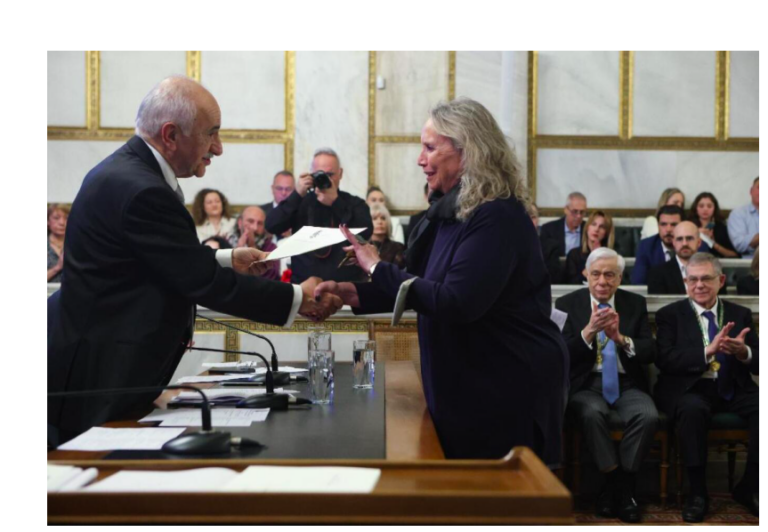– Greetings! Just when we were almost done with the PASOK crowd and thought we’d be bored with the government’s dull antics, bam, the SYRIZA people pop up to give us life and fodder for instant commentary. Kasselakis exploded in fury because, as EfSyn (a newspaper aligned with them) reported, some details from his declaration of assets came to light. I have a few questions about this. First off, look who’s talking! The very people who built careers off their opponents’ asset declarations, including family members (Mareva), without, of course, any substantial revelations. They even changed the law to drag in wives, and now they act like they know nothing. You’ll say, “But Kasselakis wasn’t around then,” so is he not to blame? Really now, if that’s the case, he should’ve gone to a different party because SYRIZA has been specializing in mudslinging for years. However, I don’t agree this time that this is mudslinging from a newspaper because, quite simply, Stefanos, as a fresh politician claiming to represent what’s clean and transparent, should’ve presented his declaration voluntarily from the moment he entered the public eye, instead of hiding behind legal tricks, personal data claims with warnings, etc. Man, you said you submitted your assets declaration in Thessaloniki during the election campaign. So, if you handed it over to the Supreme Court and your party, why not release it publicly from the get-go and be done with it? Of course, the others were eagerly waiting to…roast him with his declaration, because as I see now, there are quite a few questions arising since it’s been made public. Anyway, my source insists that they won’t end up expelling him, despite the rumors, because it would just make him a victim.
Pavlos, see you in 2027
– Let’s hop over to PASOK for a bit, where preparations for the debate are in full swing (Doukas, get practicing…). Pavlos met with both, and while I don’t know what he said to Androulakis, he subtly—due to his style—told Doukas something like, “I’ll wait for Androulakis to lose in the 2027 elections, and then I’ll become PASOK’s leader.” As for you, go handle the city’s garbage, just saying. Now, no one can be sure about an election that hasn’t even started, but the numbers don’t seem to favor the mayor. At any rate, Doukas is doing great in his hometowns, Thebes and Livadia, and don’t forget, two Sundays from now, he’ll be walking down the aisle as a groom.
Anna + Nikos = Love
– Now, as for Anna, I’m not sure why she’s keeping so quiet when she should’ve spoken up by now, because her silence is being interpreted as “highly suspicious,” like she’s made some kind of deal with the leader for the next day. Given that Nikos Androulakis is known as a man of his word in the political scene, and Anna is steadfast in her opinions, one can see how well this could go. Still, we never imagined that voting for Anna would mean ending up with Nikos and, in the background, Kyriakos.
The Battle for the Superfund
– Since there’s some nervousness in the market, with various unfounded claims floating around about the Superfund, here’s what’s actually happening from a reliable source. The organization of the Superfund will be based on the relevant McKinsey report, which was delivered to the Ministry of Finance last week. The study’s recommendations for the structure of the Superfund align with the Government’s views, so McKinsey’s suggestions will serve as the basis for decisions. Under the new law, a Corporate Governance Council is being formed to replace the Supervisory Council. Jean Le Pape will continue as Chair, and K. Cardiff, chosen by the European Commission and the ESM, will remain a member. The three new members to be appointed by the Greek side (and approved by the institutions) will include the General Director of the Public Debt Management Agency, D. Tsakonas, a deputy governor from the Bank of Greece recommended by G. Stournaras, and a General Secretary from the Ministry of Finance.
End for Dimitriadis, the Chairman Stays
– Once the Council is formed (talks are ongoing), it will initiate the process to hire the new CEO of the Superfund, with the aim of completing it no later than February. There aren’t many certainties during such a process, but some things are already clear. From the current administration, Chairman St. Theodoridis will stay, while the current CEO, Gr. Dimitriadis, will leave at the end of his term. The most likely successor for the CEO position is D. Politis from TAIPED, or possibly another candidate who will emerge from the process.
Gregory’s chain buys 20% of Mailo’s
– The company “Mailo’s: The Pasta Project,” which started in 2015 by young chef Nikos Moutsouroufis, is now valued at 20 million euros. It opened its first store in 2019, promoting the concept of Fresh Pasta Street Food. Today, the company has 40 stores, a turnover of 20 million euros, and as of yesterday, a powerful shareholder: Vlassis Georgatos from the “Gregory’s” chain, who paid 4 million euros to acquire 20% of “Mailo’s: The Pasta Project.” Mailo’s pasta dishes have become a trend among the youth. An idea born out of the crisis, it flourished and grew rapidly, delivering tangible results.
The Stasinopoulos family heads to America
– It’s time for another Greek industry to expand its production into the US. CENERGY HOLDINGS, a subsidiary of the VIOHALCO Group, has already set plans in motion to build a cable manufacturing plant in Baltimore, Maryland. To fund the first phase of the investment, they are raising up to 200 million euros. The capital increase began yesterday and will end on Thursday, October 10. According to company leaders, this capital raise has a unique feature: it is conducted through a public offering of new common shares, eliminating existing shareholders’ pre-emptive rights and implementing preferential allocation to minority shareholders participating in the increase. The goal is to bring in new shareholders and increase the free float to around 30% (from the current 20%), as VIOHALCO, the main shareholder, will not participate, but preferential allocation will be given to minority shareholders who join the capital raise.
They already have orders
– As for the investment, CEO Alexis Alexiou and CFO Alexandros Benos emphasized that with the Baltimore investment, Cenergy is entering a booming market (there is a great need for network modernization in the US), estimated to be worth $20 billion. Given that demand for cables is exceptionally high and profit margins are nearly double those in Europe, Cenergy is optimistic about the project’s success. They already have orders from the US market, which will be filled by the Thiva plant. The approval for the Prospectus by the Capital Markets Commission was timely, coming last Monday. Cenergy’s executives have found that the approval process for an investment in Europe takes three times longer and costs more than in the US. Moreover, once production starts in the US (estimated by late 2027), Cenergy will be able to “export” in dollar terms and add the EBITDA to the consolidated 2028 balance sheet.
Coming soon… Aviation tourism
– Aviation tourism is on the way: On Thursday, the Aviation Tourism Committee, initially established in 2023 and re-established in April 2024 by the Ministry of Infrastructure in cooperation with the Ministry of Tourism, will meet for the first time. Deputy Minister of Infrastructure and Transport Vasilis Oikonomou announced this yesterday at a hoteliers’ conference in Zakynthos. During this meeting, the issue of seaplanes will also be discussed, though as the column notes, the start of seaplane services keeps getting pushed back. Aviation tourism—which targets “deep pockets,” as the Greek tourism industry needs—is about using regional airports for small private planes. As an example, Oikonomou mentioned the Megara airport as a facility that could host activities for this specific niche.
An important change in Real Estate transfers
– An important legislative change was passed last week in Parliament, facilitating those who own property and wanted to transfer it but faced insurmountable bureaucratic obstacles. Until now, when – through new measurements – a new, more accurate square footage for an apartment that was about to be transferred emerged, the owner did not have the option to modify the square footage in their contract for the apartment. They needed the consent of the other apartment owners to change the “horizontal property arrangement” with the “millimeters” of the building, something that was often difficult and time-consuming. Now, with the new law, every owner can unilaterally modify their contract without needing the consent of their neighbors, while simultaneously ensuring the rights of all. This means less bureaucracy and more freedom for any owner wanting to transfer their apartment.
The “Prokopiou Effect” at Lamda
– The capitalization of Lamda Development reached €1.3 billion, following a steadily upward trajectory, particularly after September 17, the day the €120 million agreement between Lamda Development and shipowner G. Prokopiou was announced at Ellinikon. Skiti Enterprises purchased the plots to develop an office complex as well as an educational institution, investing a total of €500 million. Since then, Lamda’s shares have been rising slowly but steadily, with increased trading volume, a sign that others want to participate in the “Prokopiou effect.” Eurobank Securities estimates that Lamda Development’s value at the current price (€7.7) only reflects the value of the land and infrastructure at Ellinikon but will increase to €9.5 as the project progresses.
Foreigners are selling
– Alone, Alpha Bank could not bear the weight of yesterday’s session on the Stock Exchange. Coca-Cola couldn’t help because there were significant pressures on the stock at the London Stock Exchange, while National Bank and Cenergy were desperately seeking new balances after the recent internationalization of their shareholder structure. Lamda Development, GEK TERNA, Sarantis, and ELLAKTOR tried to help the situation and ultimately succeeded in closing the General Index with a slight decline of -0.17% at 1,417 points, with transaction value just over €101 million (€5.3 million in packages). The stock market is brazenly ignoring the laudatory reports from UBS, Goldman Sachs, and Global X and is focusing more on the statistics showing that for five consecutive months, foreign sellers on the Athens Stock Exchange have outnumbered buyers. The atmosphere in international markets is not favorable, yet it doesn’t inspire major concerns—except, of course, for unpredictable geopolitical developments. Neither Aegean, which announced results yesterday after the session closed, nor OPAP, nor the strong TITAN maintained a positive sign, so the session rolled on without any particular outbursts. Two packages stood out with a difference of just a few seconds: at 12:39 and at 12:39:38, a package of 400,000 and another of 600,000 shares of Intralot changed hands, transactions that—according to market sources—concern a major shareholder of Intracom Holdings.
Gold and Debt
– The price of gold has risen by 53% over the past three years, offering a return almost double that of the S&P 500 index, which is soaring to record levels. Over the last 12 months, gold has increased by 34%. History and statistics teach us that historically, the price of gold always “inflates” before a major recession. We saw this happen before the oil crisis of 1973, the crisis of 1980, and also before the Lehman Brothers crisis in 2008. Today we see that the officially reported global gold reserves have reached 1,170 million ounces, higher even than when U.S. President Richard Nixon was preparing to break the connection between the U.S. dollar and gold in 1971. What markets fear today, apart from geopolitical tension, is the “global public debt bubble.” Over-indebtedness is not a privilege of small Greece. It also concerns G7 countries: Japan: 255% of GDP, Italy: 139%, the United States: 123%, France: 112%, Canada: 105%, the United Kingdom: 104%. Germany stands out with public debt at only 64% of GDP, but the country is already completing its second consecutive year of recession, facing an unprecedented energy crisis, as well as a sudden and pressing need to increase its defense spending.
Ask me anything
Explore related questions





